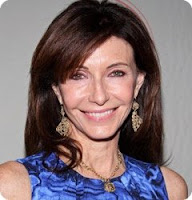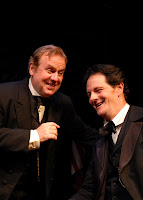
How does this CSI star stay grounded? Her small-town roots.
This essay by actress Marg Helgenberger appeared in
Guideposts magazine.
There’s an old saying that the job of good parents is to give their children roots and wings—values to keep them grounded and the courage to follow their own dreams. I feel blessed because my mom and dad gave me both strong roots and strong wings.
I was born and raised in North Bend, Nebraska, population 1,213. Mom was a school nurse and Dad was the inspector at the meatpacking plant. We lived in a house built in 1915 on Locust Street across from the town pool where, every summer, I was a lifeguard. As soon as my day was done, my friends and I rode our bikes down to the sandpit to fish for catfish and bluegill.
You couldn’t get in much trouble in North Bend, because there was always someone looking out for you. And with Mom as the nurse at North Bend Central, there was no way I could play hooky. Maybe once or twice I went to her office with an upset stomach. She’d give me some saltine crackers and make me take a nap on the cot for 20 minutes. That was all.
There were three of us kids—I was in the middle—and Dad taught us all in the catechism classes at church. His specialty was using pop songs to illustrate faith lessons. I don’t know how he managed to get a message out of Loggins and Messina or Kenny Rogers’ latest chart-topper, but he sure kept the class from getting bored.
We learned from both of our parents that prayer was part of everyday life. Mom had her prayer group, and in Dad’s case it made him one of the most upbeat, positive people I’ve ever met. When he had a bad day he’d just say, “If the sun’s not shining on me then at least it’s shining on someone else.” Talk about deep roots.
Who’d want to leave this idyllic, small-town life behind, right? Well, in my late teens I caught the acting bug, and my high school drama teacher, Ms. VonRein, had me compete in speech tournaments all around the state. Dramatic interpretation was my thing.
I remember coming home from one speech tournament and announcing I was going to move away so I could study acting. Mom was aghast—how was I going to make a living as an actress?—but Dad encouraged me right from the start. “You should do what you believe in,” he said. Time to spread my wings.
First stop was Kearney State College, then Northwestern University outside of Chicago, which had a top-notch drama program. It was pretty intimidating to be in a big city on a campus with tons of talented actors. Still, I started getting cast for some really good lead roles like Blanche DuBois in
A Streetcar Named Desire and Kate in
The Taming of the Shrew.
Summers back home Dad got me a job at the plant, trimming fat and boning raw meat. It was brutal work, physically demanding and exhausting. There were days I wanted to quit. “Hang tough,” Dad would say, and that’s just what I did.
Then the floor fell out from under my perfect world. It was just at the end of spring term junior year. I was heading back to Nebraska and I remember calling home from the pay phone in the dorm corridor to let them know when I’d be there. Mom—ever practical—mentioned that she was going to the hospital the next day for a lumpectomy.
“Don’t worry, honey,” she said. “It’s just routine surgery.” But when I landed at the airport and Dad met me at the gate, I could tell from his expression that I should be plenty worried. “It’s cancer,” Dad said. “She had to have a mastectomy.”
Tears blurred my eyes. I could barely find my luggage at the baggage carousel. For the next few days I prayed as hard as I could. I couldn’t believe that something like this could happen to my mom, who took such good care of her health.
For a year she had chemotherapy and radiation, getting violently ill after each treatment. I was so worried I dropped out of school. I only went back to my classes when her cancer went into remission.
The respite didn’t last long. This time it was my dad. He had a curious numbness in his hands and arms. Then he started walking with a limp. The doctors couldn’t figure out what the problem was. Finally they came up with the diagnosis: multiple sclerosis.
Dad was Dad. He battled MS with his sunny temperament and loads of faith. He’d get cortisone treatments and the symptoms would recede, then the disease would return with a vengeance, leaving him wheelchair-bound.
I graduated from college and moved to New York to pursue acting. I was very proud to get a part on the soap opera "Ryan’s Hope." That meant I could send money home to help defray Dad’s medical expenses. But sometimes in the loneliness of the big city, the struggles of making it in acting got to me, and I wondered, What was the use of spreading my wings if I couldn’t be with the people I loved most?
Dad, though, wouldn’t hear of me giving up my dream, even when his condition went downhill. “If the sun’s not shining on me,” he’d still say, “at least I can think of it shining on someone else.” That’s what life was for him to the end. Keeping positive, keeping focused on others, not wallowing in self-pity. The last time I saw him, he had sunk into a coma. I sat by his bedside, holding his hand, fighting back my sorrow. “Someday,” I told him, “I’ll put this town on the map.” That was a someday he always believed in.
At his funeral, the church was filled with his catechism students who had learned about faith from pop songs. I’m sure more than one of us were singing under our breath as we listened to the prayers and the hymns. But in my grief, there was one thing I couldn’t do. I couldn’t pray. I was too angry. Too hurt. Dad had been so young. Only 50. Why would God take him away from us? Why now?
I returned to acting, moved to Los Angeles and landed film and TV roles. Some days an audition would go well or I’d get good feedback from a casting director. Other days all I’d get were rejections, and I’d sink into despair.
Was I banging my head against a wall? How would I ever move ahead? Why didn’t I just give up? The hangover of grief pulled me down. Those few times I was tempted to pray I couldn’t find the words. I was still so angry at God.
One day I was sitting in my apartment in L.A. waiting for a call and dreading the bad news that might come: “Sorry, you just aren’t right for the part” or “It just went to someone else,” when I thought of Dad.
I remembered his catechism class, his sunny temperament, his reaction at the dinner table when I told my parents that I was going to leave town to become an actress: “You should do what you believe in.” I thought of the job at the meatpacking plant and how I had days I wanted to give up. “Hang tough,” Dad had said. He would never give up, even on the worst of his days. Hang tough.
I closed my eyes and said a prayer—the first I’d said in months. I told God everything. I’d never be able to understand why Dad had died at 50 or why Mom had struggled through breast cancer, but I couldn’t keep closing God out. I needed to talk to him, the way my parents always talked to him.
“God, I still need you in my life,” I prayed. I couldn’t hang tough on my own. I needed to dig deep into the values and faith my family had given me. That’s what would sustain me, what had always sustained the Helgenbergers.
Today Mom has remarried and still lives in Nebraska. She meets with her prayer group and goes to church every week. She’s no longer the school nurse at North Bend Central, but she wouldn’t hesitate to tell me I should have a few saltines and take a nap if I have an upset stomach. I call her all the time and hear about news back home.
Not long ago I returned to town for a special ceremony. They were renaming Locust Street, the block where our old house was, in my honor. Can you imagine? I hugged old friends and met with the drama department from the class of ’77. Then I looked at the new street sign with “Helgenberger Ave.” on it.
“Dad,” I wanted to say, “if I haven’t put North Bend on the map, well, at least they’ve put us on their map.”
I’m very grateful for the success I’ve had. Success can either go to your head or totally humble you. Gratitude keeps everything in perspective. My role on CSI has been fascinating, and every time I make a movie I wish Dad were still around so he could see it.
I stuck it out because of him and Mom, their prayers and their faith in me. I couldn’t have come this far without them. Roots and wings. Yes, they gave me both.




























